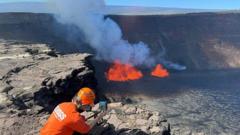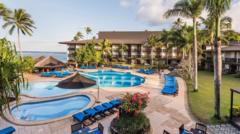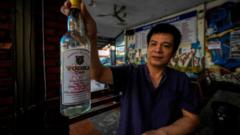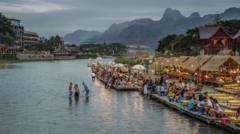Recent fatalities among tourists in Laos due to suspected methanol poisoning highlight a critical public health issue in Southeast Asia, where bootleg alcohol is prevalent and regulations are sparse.
Rising Concerns Over Methanol Poisoning Amid Tourist Deaths in Southeast Asia
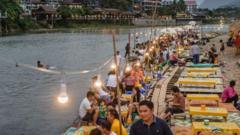
Rising Concerns Over Methanol Poisoning Amid Tourist Deaths in Southeast Asia
Tragic methanol poisoning incidents in Laos shed light on the ongoing dangers of unregulated alcohol consumption in Southeast Asia.
In a tragic turn of events, five tourists have died in Laos’ popular holiday destination of Vang Vieng due to suspected methanol poisoning, raising alarm over the dangers of unregulated alcohol consumption in Southeast Asia. Among the deceased are a British woman, an Australian woman, a US man, and two Danish nationals, while another Australian remains in critical condition. Authorities are investigating the deaths, which are believed to be linked to tainted drinks containing methanol — a toxic substance commonly found in illicit alcoholic beverages.
Methanol poisoning has long plagued the region, particularly in lesser-developed countries along the Mekong River. Despite warnings from foreign governments about the risks of consuming alcohol in these areas, awareness among the backpacker community seems alarmingly low. Methanol, which is colourless and odourless, can be challenging to detect, and symptoms often do not appear until 24 hours after consumption. These can escalate quickly, leading to significant health risks and often resulting in fatalities if not treated in time.
Methanol is a hazardous industrial substance used in a variety of products, from paint thinners to antifreeze. Ingestion of as little as 25ml can be lethal, with fatality rates reaching between 20% to 40%, according to reports from international medical organization Medecins Sans Frontieres (MSF). The issue of methanol contamination is most severe in Southeast Asia, which has the highest recorded incidents globally, largely affecting poorer countries like Laos, Indonesia, and Cambodia.
Vang Vieng caters predominantly to tourists, thriving on its array of bars, restaurants, and hostels. However, inadequate law enforcement and a lack of regulatory standards around food and alcohol often lead to unsafe drinking environments. Local producers sometimes resort to using methanol due to its lower cost, significantly increasing the risk to public health.
Concerns about methanol poisoning are not new; various incidents are frequently reported to consulates across the region, demonstrating a pattern of negligence and exploitation in the alcohol industry. Efforts persist to inform tourists about the dangers, with campaigns urging caution around mixed drinks and home-brewed alcohol.
Despite heightened awareness following recent events, industry experts, including a Western diplomat engaged in the area, stress the need for broader education and reform. While some campaigns are already underway, the diplomat believes a comprehensive, high-profile initiative is necessary to effectively reach tourists. As the spotlight intensifies on this preventable crisis, the ongoing risks associated with bootleg alcohol in Southeast Asia warrant immediate attention and action.








